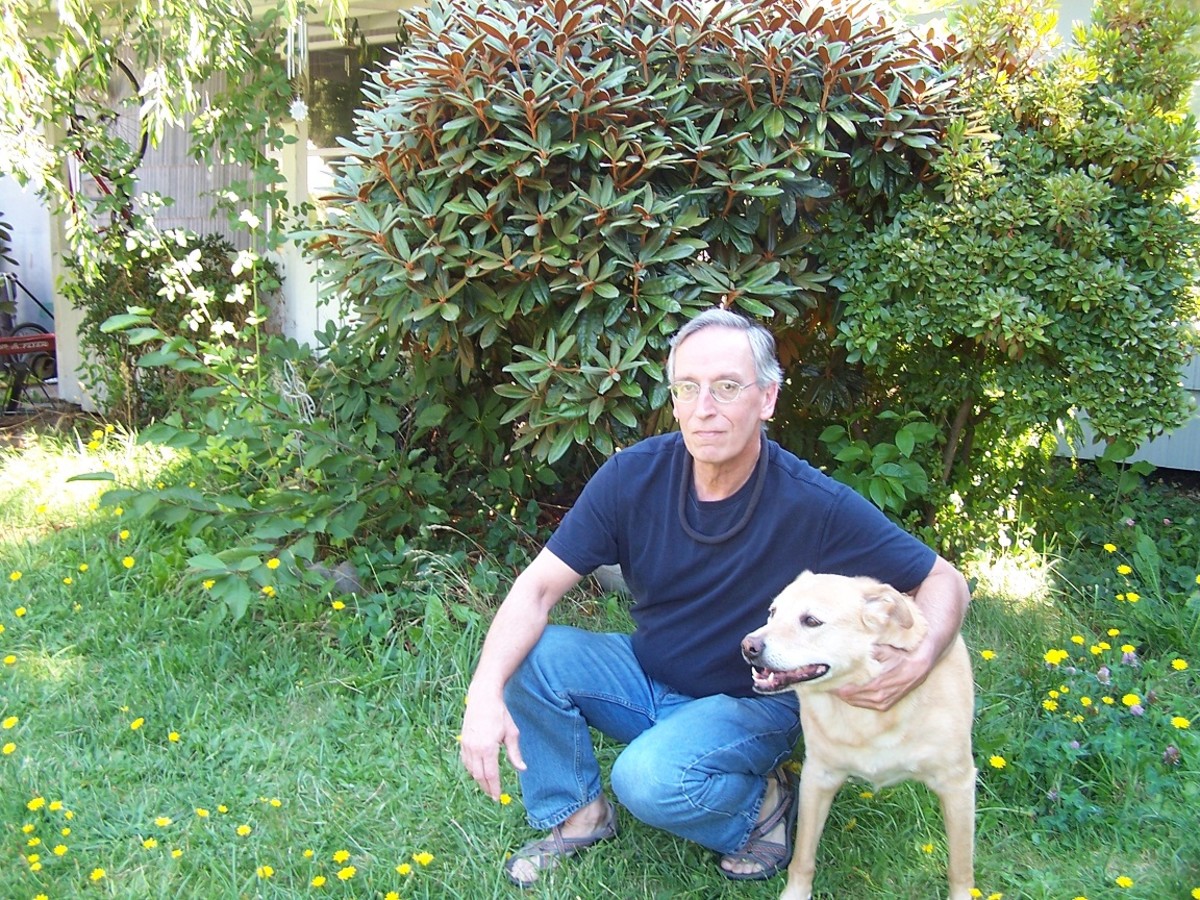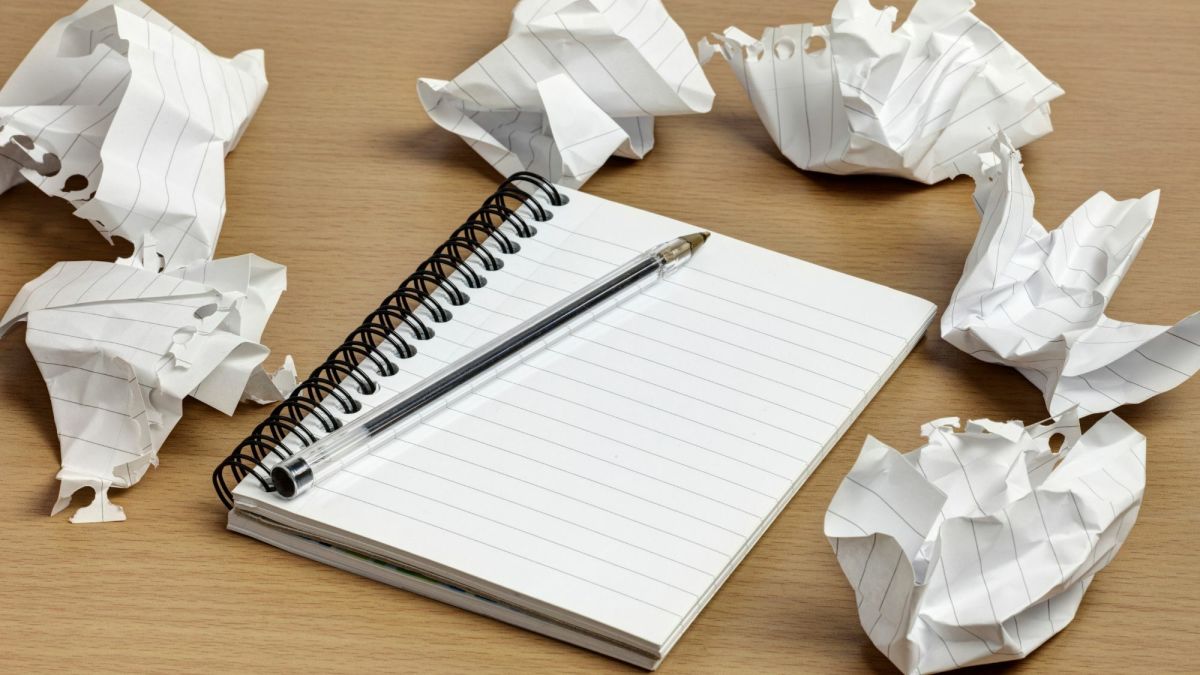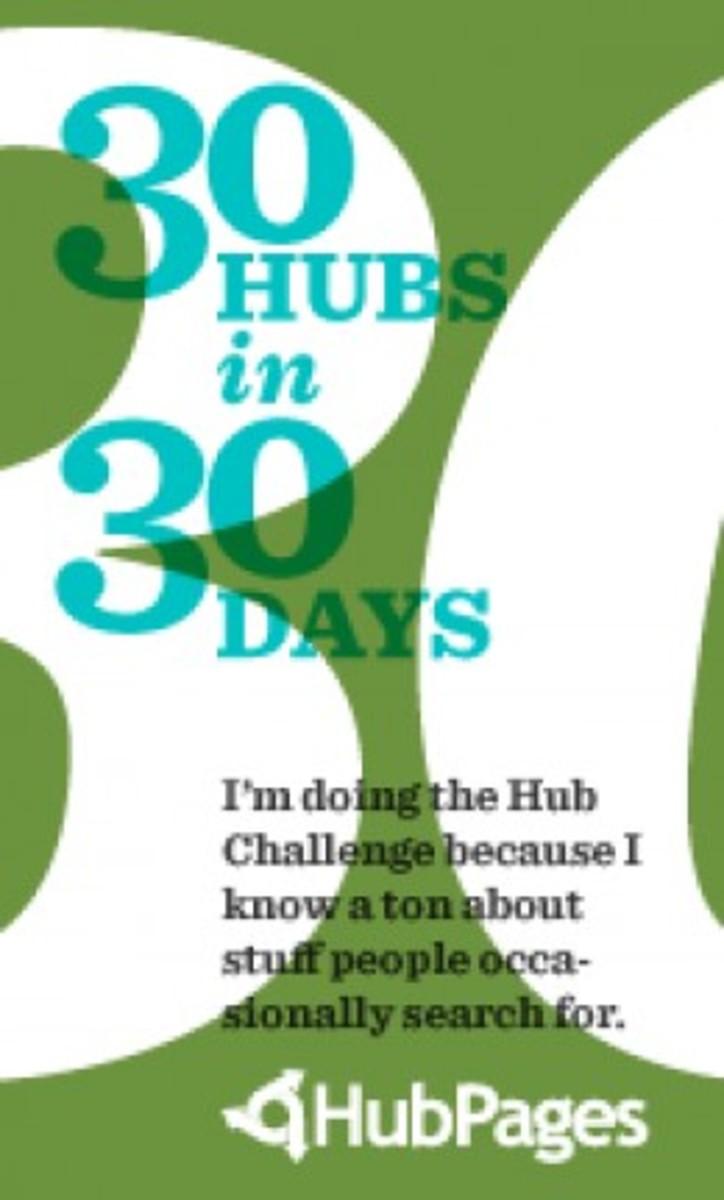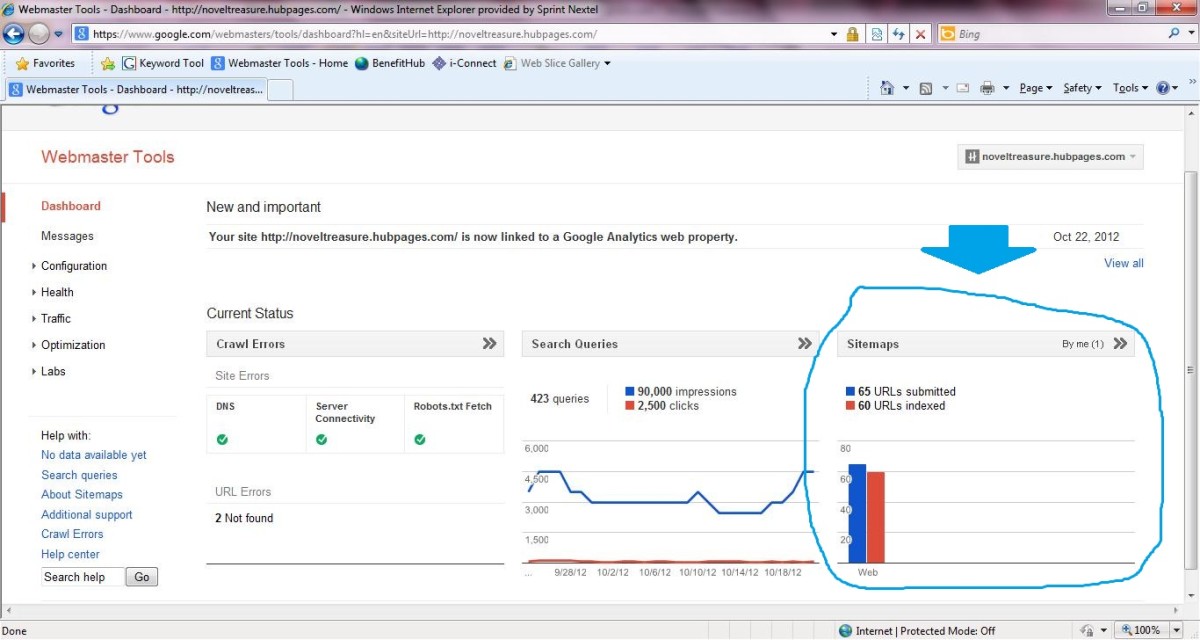Starting Another HubChallenge 30 Hubs in 30 Days
I can't help it... challenges are irresistible!
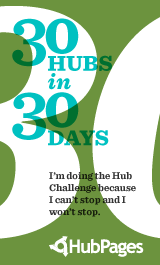
Why am I doing this again?
Because last time I did 30 Hubs in 30 days on what was supposed to be 100 Hubs in 30 Days, started late, still went well beyond 30 and saw some increase in my traffic as well as got back to my writing. I've been doing Daily Art for a while and it's done wonders for my drawing and painting skills. Writing How-To here, at eHow and most of all at my oil pastels website has been paying off. I'm now getting much more comfortable with nonfiction.
It flows as well as novel plots do, though short stories are still tough for me since "novel" is my natural length. I tend to write very long Hubs at times. It helps to break them up with art, so I'll be doing that again and once more finding ways to make the images relate to the topic. You don't really need to see a beautiful still life of fresh fruit in a rant about television and dieting.
But then again, it may make the fruit look more tempting than the Four American Food Groups: Chocolate/Sweets, Fried Meats, Salty and Preservatives.
I had fun with it last time and I'll have fun with it again.
Now since you probably would like to get some tips and advice on pulling this off instead of just a short biographical ramble on why I'm obsessed with slamming keys at over 100 words per minute on any helpless website that'll accept my prose, I'll stick in another current artwork and find some weird way to connect it with the topic of Writing Challenges.
Prompts Are Useful!

Tip #1 -- Use Prompts
You can buy books of 365 writing ideas in calendars or little books, you can find prompts in many online writing groups, you can find prompts anywhere. In fact, anything can become a prompt.
Skim the news online. Chances are there's something in it that ticks you off. It could be an ad, it could be an article with a slant you don't agree with, it could be anything. Finding topics for new Hubs is fairly easy once you recognize how many topics you're already familiar enough with to have an opinion.
Some of my friends review TV shows and movies. So whatever you did last night can be grist for a new Hub. Other topics can include any passion or hobby. I love writing about art and collecting art supplies, comparing different brands, so product reviews on any art supplies I bought that don't relate in any way to oil pastels are good topics for me. I've already reviewed several art books on colored pencils in Hubs.
I can expand on that topic to throw in reviews of favorite fiction, watercolor books, oil painting books, general drawing books -- anything that's on my bookshelf is a potential topic. But let's look at the bookshelf again for something else. What other reference books do I have?
A good half dozen references on prehistoric life, why haven't I done a good Hub yet on dinosaurs or prehistoric mammals? Haven't gotten around to it.
Another friend, pgrundy, started a series of profitable topics by looking at high-demand keywords and product-related articles, then posting Hubs with topics that mention those keywords or products. You could review your cell phone. Or do something on lingerie -- she wrote a screamingly funny Hub on women's lingerie and it was full of lingerie ads in the sidelines -- compared with the vintage ad images she used for the article, they were hilarious. Some things just don't change.
When all else fails, open a dictionary.
Just flip through it at random till you see a word that makes you think of a topic. Close your eyes, flip to a random page, put your finger in and then see what word comes up.
Whatever it is, the puzzle of figuring out a way to turn it into a topic can be a lot of fun. Do word association on it. That'll start generating title possibilities. If it's a silly word, you can turn it into a humor column. If it's a serious topic, then write a serious article.
If it makes you mad, write it. If it makes you happy, write it. Whatever matters most to you is going to start becoming a perennial topic category and it's not that hard to write Hubs in a series either.
Another excellent set of topics is to look at the things you do well. One friend here posts recipes with anecdotes about cooking and family history. Others get into software or mechanics or anything they spend a lot of time doing. If you've done a hobby for over a year, you can probably write good beginner articles on it.
The way to turn all these possible topics into a self-generated set of prompts is to start an Ideafile document. Jot any idea you get at any time of the day, if you put them on sticky notes, organize and consolidate them typing them into your Ideafile. Use about a sentence or two for each of them, not just one word because you might not remember what you meant by a prompt that was just one word.
Series ideas happen when your topic is too big to put in one Hub. Just break it down and write about different aspects of it. If you need to understand the simple stuff first before getting to the more complex, then number the series and link to all the previous ones in each Hub so new readers don't start at the end and get confused reading it backwards.
One way to decide on what prompt to use is to number your prompts, then roll dice for a number between 01 and 100 using dungeon dice. You can get ten and twenty sided dungeon dice at any number of game stores. I used to love doing that while writing novels too. I got used to random encounter charts as a gamemaster, so when I've got a character in a tight conflict and the story would work just as well either way, I roll dice to see how well they do and write it according to how they rolled.
Everything you've ever taken an interest in throughout your life is a potential prompt for your Ideafile. So instead of trying to do every prompt in the 365 day book, pick out the ones you like most and put those in your personal list.
The best way to get ideas is to keep writing whenever you get one, just on impulse. The more attention you pay to your ideas, the faster they come. Most writers get more ideas than they can use in three lifetimes, just from the habit of paying attention to them. You'll discover your pet topics belatedly when you find out you've done variations on them a dozen times and still don't get tired of writing about it.
Whatever you care about, somewhere out in the Internet thousands of people or millions care about it too and want to read what you have to say.
Tip #2 -- Get Comfortable
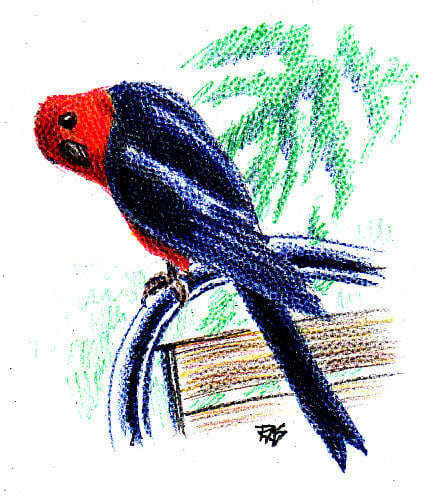
Physical Comfort in your Writing Area Matters!
Get your favorite chair. Turn on your favorite music -- music is always a good writing enhancement, it sets a pace and keeps your blood moving. Make sure you have coffee, tea, drink of choice near at hand and anything else you need like cigarettes, a snack, whatever makes you comfortable.
HubPages writing isn't like working for some supervisor in an office. You can go ahead and wear your pajamas if you're more comfortable in them and it's okay to put your feet up. Or get up and walk around. Whatever works for you is fine -- that's what the big perk of freelancing is, you can do things your way.
So pay attention to whatever motivates you most to write and make your writing area a more inviting place than say, the sofa in front of the TV or game machine.
Minor inconveniences like a table that's too low or high can start adding up to physical fatigue, pain and loss of concentration. They also have a minor aversion factor if you're constantly running into the problem but don't solve it -- your body reacts to physical conditioning. You will feel better if everything about your writing area makes you feel good and want to spend hours there than if it's got any painful or difficult elements.
Some people need a messy desk to write well, with a lot of interesting prompts-like objects and reference books and papers around. Others have a ritual of cleaning the desk before starting anything. Do whichever version makes you feel comfortable -- but try to build a good routine.
Habits are self-sustaining. If you always sit down at the same time of day to write and do things in the same order on the computer, you'll do your daily Hub in order along with the rest of the things you're doing. So think about what's the best time of day to fit it in. Do you like writing when you first get up, before you're fully awake? Many creative writers do.
Also, one thing about first thing when you get up writing is that it's less likely to be put off. If you do it as part of a morning ritual then it really becomes convenient, it gets you off your feet till you're fully awake and lets your mind roam when you're at your most creative. Also things that get done first by habit are simply more likely to get done and won't get put off in favor of other things that need to be done.
Another common pattern for writers is to stay up late when everyone else has gone to bed. What these two strategies have in common is solitude -- no interruptions, no other people trying to get your attention.
DVDs and music downloads are better than radio because you're not going to get distracted by the ads. Even on sound media, ads are irritating distractions. They usually pitch louder and have obnoxious noises to get your attention -- everything about an ad is crafted to get your attention, when what you need in order to write is the ability to concentrate for long enough to get the article done. So leave the radio and TV off in favor of background sound on your computer.
Playing the same music or style of music every time is another type of good habit, one that can lead to the music being a prompt to write anytime you hear it.
Most of all, do things your way and your results will turn out their best.
Now would not be the time to start it, while doing a writing challenge. But if you are warming up to something like Nanowrimo or the 3 Day Novel Contest as I am, consider switching from a standard Qwertyuiop keyboard layout to the Dvorak keyboard layout. It helps to give yourself at least three months to learn it, maybe six months before you'll get back to the same typing speed you had before starting a new layout.
However, once you've been using Dvorak keyboard layout for a year, something wonderful happens. Your typing speed goes up on average about 20 words per minute. This speeds up any kind of writing that you do, be it novelwriting or HubPages or term papers. Also, it helps prevent carpal tunnel syndrome and other repetitive motion disorders. You're working faster but moving your hands less.
Be sure to use a keyboard sized comfortably for your hands. I have short stubby fingers and I'm most comfortable on a netbook or laptop. Some people with large hands go nuts trying to use laptop keyboards and will have it a lot easier plugging in a full size keyboard or even an oversize one. Use what works for you. Don't worry about whether other people would be happy with it or not, your keyboard is your tool and should be scaled to your real needs. If you also love laptops and need a big keyboard, consider looking at the 17" widescreen ones, they tend to have larger inbuilt keyboards sometimes.
Don't Worry About Getting It Perfect

Tip #3: Separate Editing from Rough Draft Writing
Writers who self-edit while creating their work take longer about it. They may halt to fiddle with a nearly-perfect sentence and polish it till it has a great punch -- and then forget what the article is about. To start writing, start writing badly.
Just "freewrite." Get it down as you think about it. Don't worry about whether the subtopics are in order, the spelling is perfect or the punctuation elegant. That's all stuff you can mechanically fix systematically once you have the basic article done.
It's more efficient to write whatever comes into your head on the topic fast without looking down, then edit, than it is to edit while it's going on. Writing rough drafts is a creative right-brained activity as spontaneous as painting in watercolor. Editing them into polished finished prose is a systematic, organized, logical left-brained activity. These are completely different states of mind.
Everyone is actually capable of both, and using language does touch on both because verbal skills are left-brained but making up a story, true or imagined, is right-brained. Writers need to be able to switch gears often -- this leads to an emphasis on balance, because a writer good on both sides is going to be brilliant, both creative and elegant.
Separating these functions means you're not interrupting one with the other.
One of the odd things I've found is that I write better rough drafts when I'm feeling relaxed and lazy, but edit better when I'm annoyed and grumpy. I wind up taking it out on the flaws in the work. It becomes a satisfying, mindless activity just checking spelling and fixing it, checking sentences for being too long and fixing each of these in turn. Each task is easy in itself.
Both of these modes can actually be fun in different ways. But if you're constantly criticizing what you write while you're writing it, you're shooting yourself in the foot. If you don't believe your article's going to be fun for someone to read, it's hard to make yourself keep going writing it, let alone the next one and the next one and so on.
So relax and do one part of the work at a time. Suspend all critical faculties while creating and then while editing, look at each little problem as a small, solvable one. It's easy to get overwhelmed if you see a lot of different typos.
But each of them is pretty easy to fix, as long as you run the spell check. So relax about it and don't let the editing process intimidate you. One thing I've found that really helped me is a style book, mine is The Elements of Style by Strunk & White. It's indexed, so you can systematically go through it section by section asking whether it applies to a given piece of writing.
After a while, the principles and ideas in a style book that's used often can become second nature. You don't need to stop to look them up any more. So the process is slower for a beginner, but if you apply this to your daily Hubs, one side effect is that each day's Hub will get edited easier, faster, and come out better. It may take a long time the first time you go through the style book, but the result of doing so will kick even the worst beginner into a good readable writer by way of good editing!
Enjoy the Process!

Final Tip: Talent Is Enthusiasm!
You're a cool person and a talented writer. Somewhere out there on the Internet, thousands, maybe millions of people agree with all the things you hate or love, dislike or like, want to read something you think is funny or pay attention to something you think is serious. No matter who you are, someone out there thinks your opponents are nutters and you are right on for everything about you.
That's who you're writing for.
Your core readers, your natural readers share your interests and your slant. You're an interesting person who lives in an exotic place and has many wonderful anecdotes to share. You may not realize that, because the place you live may seem so everyday to you and your life has had conflicts and boring passages and dull stuff in it... but it's only dull to you.
Someone living in another country could be completely fascinated by the most ordinary thing you notice. I find myself reading blogs by Australians and Hubs from UK writers with fascination, not just because of the lovely British spelling and neat accent, but because they live by the ocean or they have a completely different diet or their neighborhood has centuries, not just decades of history behind it. Your writing looks that exotic to them too.
Have confidence in yourself and your ability to entertain. You already have some sympathy just for being a human being. Beyond that, there are people who think your gender is cool, who really like your lifestyle, share your religion or your favorite music and are in awe that you're so articulate about it. For every writer there are hundreds of lurkers, thousands of readers.
Do it often enough and you will get good enough at the process that you could be doing it for a living. That's been my life's goal and I'm getting there on it. Writing for other writers is a joy to me because the arts are not a zero sum game.
You couldn't possibly handle my topic the same exact way I would. If you write on it, I'm probably interested because I liked the topic anyway. I could learn something from you. I also love hanging out with other writers, so that's one huge "you are a cool person" point you have about you when I know nothing else about you!
So jump on in and join the 30 Hubs in 30 Days Challenge. Daily writing is the one thing guaranteed to turn beginners into professionals -- keep it up long enough and your skills become reflex. Most of all, enjoy the process.
Reward yourself every single time you finish a Hub. Check it off on a numbered list and give yourself a treat -- any small thing will work as long as it's something you enjoy that's immediate and personal. It could be playing your favorite game. It could be watching something on TV or whatever. It could be eating a tasty fruit or standing up to dance for a minute to the radio. Whatever it is, choose something that helps you celebrate a real accomplishment.
Most of the people who want to be writers never get started. They get so intimidated by fear of criticism that they don't ever create the bad first drafts that become good edited articles and books. People are taught to expect written work to come out perfect from your head without any changes needed -- and that is as irrational as expecting your car to go 100 miles an hour before putting any gas into it.
You have the capacity to write. But you need to actually do a lot of writing to get good at it, and the only way to manage to do all the writing needed to get past being a beginner is to learn to enjoy the process of writing before reading something good with your name on it becomes its own reward. This psychological barrier is huge.
I think school has a lot to do with it, grading and criticism from teachers along with this worship of Talent and the assumption that Talented people can just do creative work without any training whatsoever. It's as complex as building your car, let alone driving it. But you're already past the worst part.
You learned how to communicate in this language already, if you can read and write, you can write a Hub. So as a beginner, compare yourself to someone who's just starting to learn English at all. Your rough drafts start to look a lot more editable!
The pleasure of creative activity is real. It's instinctive. We are human, we have a need to communicate. It matters to any human being to know that someone else understands what they wanted to say. So let your fingers do the talking... you will be very surprised at how much your writing improves just from sheer practice.
Enjoy it. There's a little reward from me just seeing one more article posted -- the process of posting it is my reward for these in the short term. In the long term, the more Hubs you have, the more likely AdSense is going to actually send you a check sooner. The more Hubs you have written, the more likely those core readers who do love you for all the random things about you that are shown in your writing will have a good time reading all of them.
They also may buy the books or items you recommended or something else related to your topic, and there comes some trickle income. One of the better rewards is writing money itself. There's proof that your words were worth reading. So join the challenge and go for it, you'll get more readers and a better shot at some money. Enjoy it.

